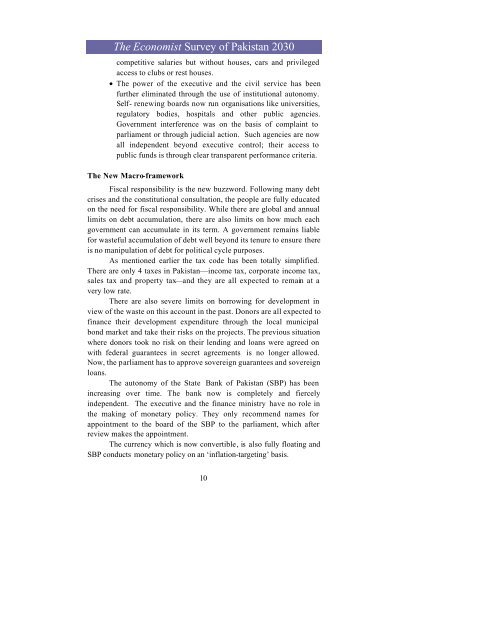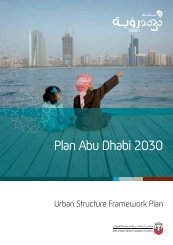economist-survey
economist-survey
economist-survey
Create successful ePaper yourself
Turn your PDF publications into a flip-book with our unique Google optimized e-Paper software.
The Economist Survey of Pakistan 2030<br />
competitive salaries but without houses, cars and privileged<br />
access to clubs or rest houses.<br />
• The power of the executive and the civil service has been<br />
further eliminated through the use of institutional autonomy.<br />
Self- renewing boards now run organisations like universities,<br />
regulatory bodies, hospitals and other public agencies.<br />
Government interference was on the basis of complaint to<br />
parliament or through judicial action. Such agencies are now<br />
all independent beyond executive control; their access to<br />
public funds is through clear transparent performance criteria.<br />
The New Macro-framework<br />
Fiscal responsibility is the new buzzword. Following many debt<br />
crises and the constitutional consultation, the people are fully educated<br />
on the need for fiscal responsibility. While there are global and annual<br />
limits on debt accumulation, there are also limits on how much each<br />
government can accumulate in its term. A government remains liable<br />
for wasteful accumulation of debt well beyond its tenure to ensure there<br />
is no manipulation of debt for political cycle purposes.<br />
As mentioned earlier the tax code has been totally simplified.<br />
There are only 4 taxes in Pakistan—income tax, corporate income tax,<br />
sales tax and property tax—and they are all expected to remain at a<br />
very low rate.<br />
There are also severe limits on borrowing for development in<br />
view of the waste on this account in the past. Donors are all expected to<br />
finance their development expenditure through the local municipal<br />
bond market and take their risks on the projects. The previous situation<br />
where donors took no risk on their lending and loans were agreed on<br />
with federal guarantees in secret agreements is no longer allowed.<br />
Now, the parliament has to approve sovereign guarantees and sovereign<br />
loans.<br />
The autonomy of the State Bank of Pakistan (SBP) has been<br />
increasing over time. The bank now is completely and fiercely<br />
independent. The executive and the finance ministry have no role in<br />
the making of monetary policy. They only recommend names for<br />
appointment to the board of the SBP to the parliament, which after<br />
review makes the appointment.<br />
The currency which is now convertible, is also fully floating and<br />
SBP conducts monetary policy on an ‘inflation-targeting’ basis.<br />
10




